

Was ist OER - OERinfo – Informationsstelle OER. Open Educational Resources - The Basics. Opencontent. Defining the "Open" in Open Content The term "open content" describes any copyrightable work (traditionally excluding software, which is described by other terms like "open source") that is licensed in a manner that provides users with free and perpetual permission to engage in the 5R activities: Retain - the right to make, own, and control copies of the content (e.g., download, duplicate, store, and manage)Reuse - the right to use the content in a wide range of ways (e.g., in a class, in a study group, on a website, in a video)Revise - the right to adapt, adjust, modify, or alter the content itself (e.g., translate the content into another language)Remix - the right to combine the original or revised content with other open content to create something new (e.g., incorporate the content into a mashup)Redistribute - the right to share copies of the original content, your revisions, or your remixes with others (e.g., give a copy of the content to a friend)
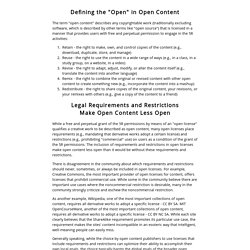
Whitepaper OER in der Hochschule und Whitepaper OER in der Weiterbildung erschienen - OERinfo – Informationsstelle OER. 4.5.2015 – wir haben zwei neue Whitepaper zu OER.
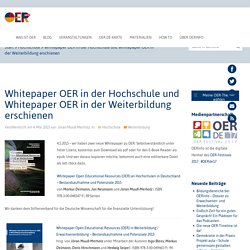
Selbstverständlich unter freier Lizenz, kostenlos zum Download als pdf oder für den E-Book-Reader als epub. L3T Kapitel: Open Access und Open Educational Resources. Digitale Lehrmittelfreiheit. Busting myths about open education. Elearningpapers eu open educational practices. Foundations for OER Strategy Development – Make a commitment to advance OER.
OER: A European policy perspective. Keywords: Open Education, OER, Policy, Europe Introduction Education and training are changing radically all over the world.
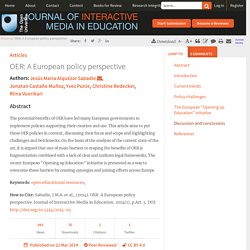
The increasing demand for education in emerging economies, however, contrasts with the financial cuts being implemented in Europe. At the same time, global competition between education providers for funding and talent is intensifying. Probably, the most disruptive pressure comes from Information and Communication Technologies (ICT) which could be potential catalysts in the (near) future of education and training (Redecker et al., 2011). The Europe 2020 strategy[1] acknowledges that a fundamental transformation of education and training is needed to address the skills and competences required for Europe to remain competitive, overcome the current economic crisis and grasp new opportunities. Educational stakeholders recognise the contribution ICT could make to achieve these targets.
Figure 1. Current trends. Open Professionals Education Network. CC licensed (BY) Flickr photo shared by David Amsler modified by Paul Stacey Reusing existing Open Educational Resources (OER) can save significant time and effort.
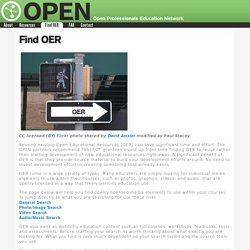
The OPEN partners recommend TAACCCT grantees invest up-front time finding OER to reuse rather than starting development of new educational resources right away. A significant benefit of OER is that they provide source material to build your development efforts around. OER Materialien beurteilen (Internetquellen) Video: Bilder unter freier Lizenz nutzen – weit verbreitete Fehler und wie man sie vermeidet. Creating open educational resources - OpenLearn - Open University - OER_1. Online Course Open Education #h817open at OU. Introduction to Openness in Education. Welcome to Introduction to Openness in Education.
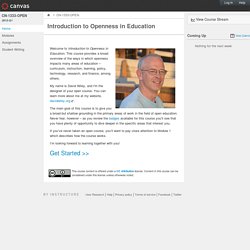
This course provides a broad overview of the ways in which openness impacts many areas of education – curriculum, instruction, learning, policy, technology, research, and finance, among others. My name is David Wiley, and I'm the designer of your open course. You can learn more about me at my website, davidwiley.org (Links to an external site.). The main goal of this course is to give you a broad but shallow grounding in the primary areas of work in the field of open education.
Never fear, however – as you review the badges available for this course you’ll see that you have plenty of opportunity to dive deeper in the specific areas that interest you. If you’ve never taken an open course, you’ll want to pay close attention to Module 1 which describes how the course works. I’m looking forward to learning together with you! Leitfaden_E-Learning_Rechtsfragen_Kreutzer_MMKH_2015.pdf. Open Educational Resources infoKit - UK.
Overview Management Learning & Teaching Technical Legal JISC/HE Academy UKOER Programme UKOER tweets Going further...
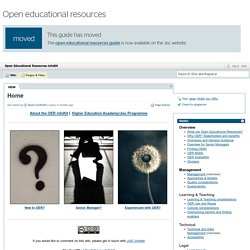
Recent changes to the infoKit Cookie statement Last Cookiweek David Kernohan, a JISC Programme Manager, commented in a Guardian article last week that Open Educational Resources are a radical idea that has now become mainstream. To try and condense some of the vast amount that has been learnt about the benefits of OER releases in the past 10 years, the Higher Education Academy and JISC have developed an InfoKit. The history of Open Education : A bibliography. Open Educational Resources - Babson Survey Research Group. Inflection Point: Educational Resources in U.S.
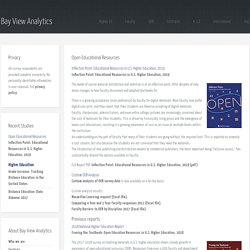
Higher Education, 2019 Inflection Point: Educational Resources in U.S. Higher Education, 2019 The model of course material distribution and selection is at an inflection point. After decades of only minor changes to how faculty discovered and adopted textbooks for. Infographic Version - Babson Study Opening the Curriculum 2014. OER in and as MOOCs (Advance online publication) Project deliverable Open Access Czerniewicz, Laura; Deacon, Andrew; Walji, Sukaina; Glover, Michael This chapter reports on the investigation into the production and rollout of four Massive Open Online Courses (MOOCs) at the University of Cape Town (UCT) in South Africa, and on the experiences of the educators involved in their production.
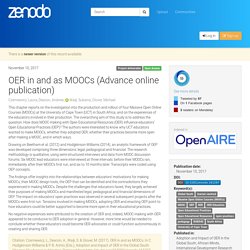
The overarching aim of this study is to address the question: How does MOOC-making with Open Educational Resources (OER) influence educators’ Open Educational Practices (OEP)? The authors were interested to know why UCT educators wanted to make MOOCs, whether they adopted OER, whether their practices become more open after making a MOOC, and in which ways. Drawing on Beetham et al. (2012) and Hodgkinson-Williams (2014), an analytic framework of OEP was developed comprising three dimensions: legal, pedagogical and financial. Identifying Categories of Open Educational Resource Users. Weller, Martin; de los Arcos, Beatriz; Farrow, Rob; Pitt, Rebecca and McAndrew, Patrick (2016).
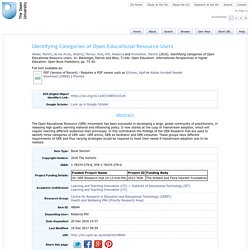
In: Blessinger, Patrick and Bliss, TJ eds. Open Education: International Perspectives in Higher Education. Open Book Publishers, pp. 73–92. Full text available as: Abstract. What's Educational about Open Educational Resources? Different Theoretical Lenses for Conceptualizing Learning with OER - Stefanie Panke, Tina Seufert, 2013. COER - Center for Open Education Research — Institut für Pädagogik. ROER4D – Research on Open Educational Resources for Development. OER Hub – Researching Open Education. Why We Fund Open Textbooks (and Plan to Do More) Textbooks aren’t new or novel, and they certainly don’t represent the cutting edge of the Open Educational Resources (OER) movement that the Hewlett Foundation has long supported.
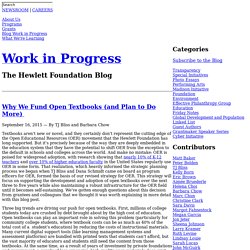
But it’s precisely because of the way they are deeply embedded in the education system that they have the potential to shift OER from the exception to the default in schools and colleges across the world. And make no mistake: OER is poised for widespread adoption, with research showing that nearly 10% of K-12 teachers and over 10% of higher education faculty in the United States regularly use OER in some form. That realization, which heavily informed the strategic planning process we began when TJ Bliss and Dana Schmidt came on board as program officers for OER, formed the basis of our revised strategy for OER. Giving Knowledge for Free - OEDC (LINK) Living With Abundant Information. OER Mythbusting. While the movement for Open Educational Resources (OER) has grown exponentially across North American higher education institutions, some myths about OER still remain.
Whether it is confusion over the meaning of open and related concepts such as free or digital, or adherence to folk wisdom such as “you get what you pay for,” there are many common misunderstandings about OER. Our hope is that it will provide a useful resource for both OER advocates and those seeking to learn more about the topic. OER Mythbusting addresses the top seven myths about OER in North American higher education, as voted on my more than 100 faculty, librarians, students and other members of the OER community. This project grew out of a discussion during one of SPARC’s Libraries and OER Forum monthly calls, where a group of librarians from the U.S. and Canada identified a need for better resources to address misconceptions about OER.
Use and Abuse of Reusable Learning Objects. 1 Movements in the Learning Object Economy In the past 5-7 years there have been considerable efforts in the computer-mediated learning field towards standardization of metadata elements to facilitate a common method for identifying, searching and retrieving Learning Objects (LOs). Recently, a consensus has emerged among the various bodies spearheading these efforts - including the IEEE Learning Technology Standards Committee (LTSC) Learning Object Metadata Working Group, the IMS Global Learning Consortium, Inc., and the Dublin Core Metadata Initiative - on what these common metadata elements might be.
Similar efforts to develop a common conceptual definition of LOs have yet to emerge. There is a broad understanding among the members of the LO community about the functional requirements of LOs: The functional requirements of LOs are similar to the benefits derived from the object characteristics in object-oriented programming. OpenEdMOOC – Introduction to Open Education. Open Education Week. » OER15. #OERde14 - Die Zukunft Freier Bildungsmaterialien – Wikimedia Deutschland. Datum: 12. & 13. September 2014 Veranstaltungsort: Urania, Berlin Adresse: An der Urania 17, 10787 Berlin Am 12. und 13. MOOC #COER13. OER Commons. MERLOT II - Home. Free Online Course Materials.
The UK's largest repository for discovering and sharing Open Educational Resources for HE, FE and Skills. OpenStax CNX - Sharing Knowledge and Building Communities. Welcome to LORO - LORO. Learning about, and experiencing, open educational practices.